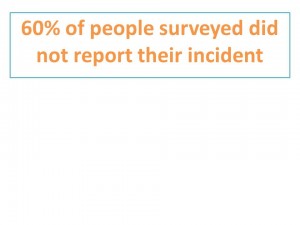Sexual crimes are a huge societal issue. However, it becomes even more difficult to deal with when this issue is prevalent in the workplace, where the bread and butter of a victim and their family are put at risk if they seek help. There must be tougher policies put in place that alleviate the stigma of sexual harassment in the workplace and encourage victims to speak out against it.
What We Don’t Know Can Hurt Us
Many people think that workplace harassment is not a prominent issue. Slater & Gordon, a law firm, conducted a study addressing this issue and found:
- 1 in 6 women have had colleagues look down their blouse or gotten comments about their breasts at work
- 1 in 8 women have left jobs because workplace harassment has made them uncomfortable
- 40% of men report harassment experiences
- 60% of everyone surveyed did not report their incident
Each and every one of us will be joining the work force sooner or later. Having a safe place to work is essential and the right of every human being. Being sexually harassed is frightening as it is. Adding on the fear of losing your job so you can ensure your physical safety makes it even worse.
Who is to Blame?
The primary perpetrator is the employer or employee that commits this act.  Exercising their power in order to commit such a demeaning and unsafe act is terrible. The people that belittle or normalize the problem, whether they are employers that are handling the complaint or normal people, are also to blame. They are diminishing the courage that these victims have to have to come forward.
Exercising their power in order to commit such a demeaning and unsafe act is terrible. The people that belittle or normalize the problem, whether they are employers that are handling the complaint or normal people, are also to blame. They are diminishing the courage that these victims have to have to come forward.
Why not complain?
Victims do not complain because:
- Of fear of losing their job or damaging their career
- Their job revolves around it (ex- waitress or bartender)
- Their complaints are against older or more experienced perpetrators
- They don’t think anything will be done anyway
- People think they don’t have a sense of humor if they do
The Fair Employment Protection Act
This policy prohibits harassment of any kind in the workplace regardless of whether the perpetrator is a supervisor or coworker. It was proposed to counter Vance v. Ball State University, which ruled that supervisor harassment only applies to supervisors that have the power to hire, fire and file employment actions against the victim. This attempted to resolve the problem of lower-level supervisors not getting punished for committing these acts.
A Call for Action
The Fair Employment Protection tries to help the problem, however it is not enough. It does not address the underlying problem- fear of reporting. To address this, a government agency should be put in place where victims can go to launch an investigation. This will make them more comfortable because they are not going to their employer. They will also be going to someone who cares about their problem. Furthermore, the following recommendations could also help with the problem:
- Harsher punishments for verbal or physical sexual abuse
- Mandatory seminars on sexual harassment and workplace etiquette
- Taking complaints and inappropriate jokes seriously
- Being aware of the problem
What Can You Do?
Employers, employees, and common people can do a lot to help solve the problem.
Get Educated.
Know about rape culture and how it affects society. Verbalize the issue to show that it is a problem whether it is discussed or not.
Provide Support.
Victims need someone there to trust them and help them through this process. Show that you care about them and their safety.
Speak Out.
Actively speak out against sexual harassment in the workplace. Intervene as a bystander or issue a complaint to show that this is a serious problem that you will not stand for.
Help Make the Workplace Safe.
Help ensure that the place that you spend the majority of your day in will be safe for everyone by enforcing strict guidelines.